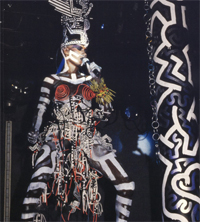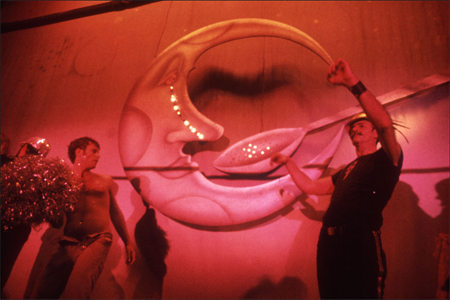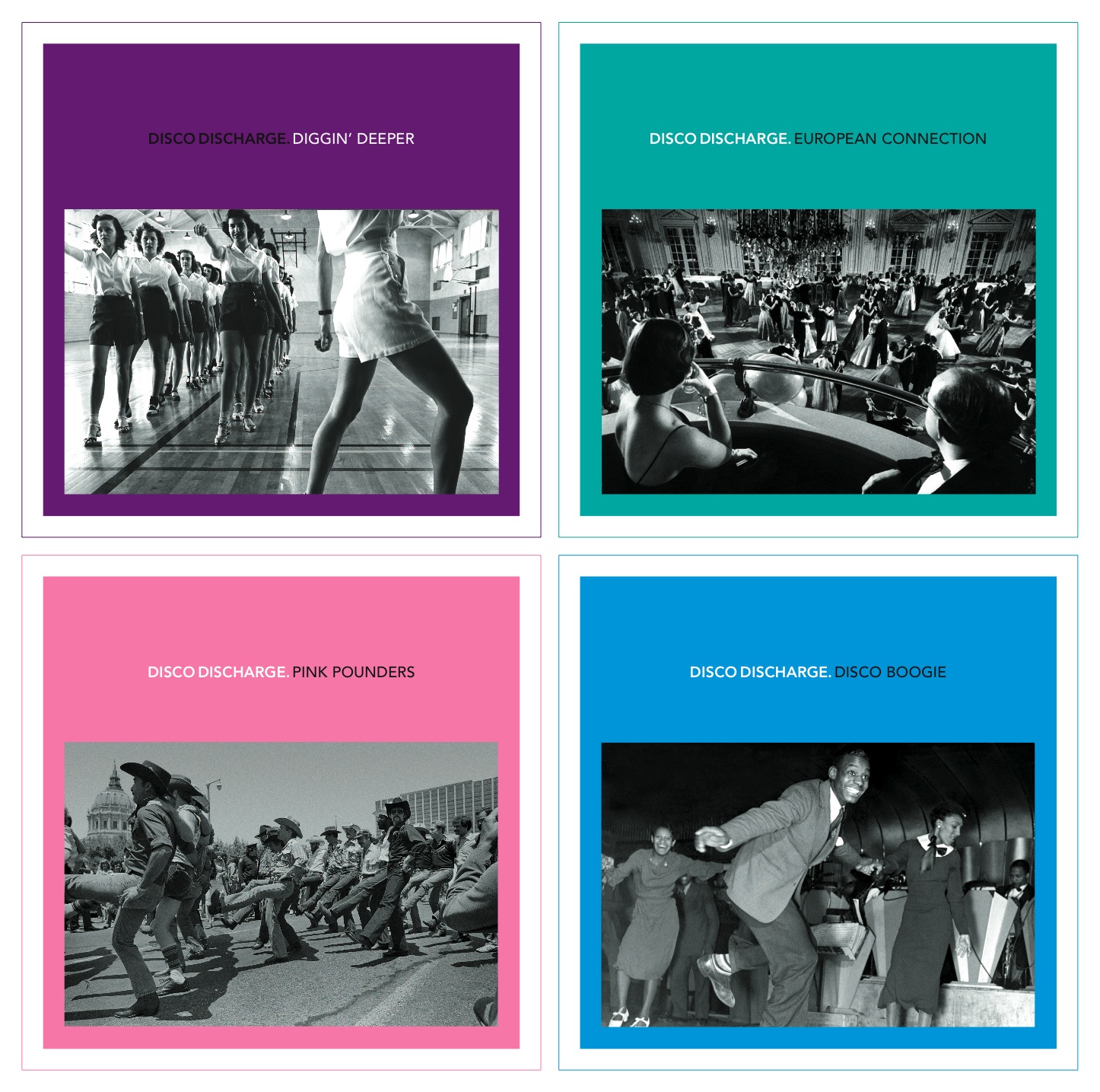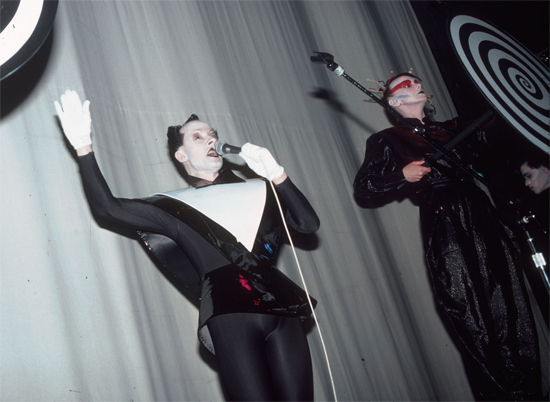Disco Boogie tracklist:
Carte Blanche – ‘Do You Like It Like That’
Avenue B Boogie Band – ‘Bumper To Bumper’
Vin Zee – ‘Funky Bee Bop’
Benelux & Nancy Dee – ‘Switch’
Frantique – ‘Getting Serious’
Carol Hahn – ‘Do Your Best’
Nick Straker Band – Straight Ahead’
The 1970s was one long party for me. It was an era of discovery, of becoming visible for the very first time, of devil-may-care pleasure seeking and of the most memorable musical moments of my life. The Disco boom arrived on the club scene just as I did and the two of us fused together as one. It’s no exaggeration to say that Disco was my first, my last, my everything. It still is. Not a day goes by that I don’t listen to my absolutely favourite Disco tracks in some form or another. Is it purely rose-tinted nostalgia on my part, a fond look back at my youth and its clear impact on my development? Possibly. Or was being gay such a major part of Disco it felt a mutually inclusive experience? Probably. Although I suspect the hosts of white-suited Tony Manero wannabes from suburbia would dispute that easy description. Or was the music just so wonderful, a constantly uplifting enchantment, it proved too irresistible. Most definitely.
I can’t think of any time, event, action or sexual encounter from this Golden era in my life without an accompanying Disco song. To this day I can still recall the exact instant I heard ‘Rock Your Baby’ by George McCrae. I was working in the then fashionable Portobello Hotel in Notting Hill Gate and a regular guest brought a copy of the 12-inch single over from New York as a gift. We practically danced the whole of that night away playing it over and over, neither of us being able to get enough of its smoothly insistent beat. Then there was the precise moment Boris Midney’s USA-European Connection ‘Love’s Coming/Baby Love’ flooded the Embassy in Old Bond Street with something so startling and completely different I stopped rigid in my tracks to listen attentively. I can remember as if it were yesterday (to paraphrase the title of one of Donna Summer’s seminal albums) being given a blow job in the balcony of New York’s legendary The Saint club, with its centrally controlled planetarium style light show, while singing along with Frankie Valli’s ‘Soul/Heaven Above Me’. And staring into a complete stranger’s eyes on a West End dance floor when ‘Deliverance’ by Space burst through the speaker system for the first time and silently nodding our totally delighted agreement in how fabulous it was. Disco was family. It was a shared understanding of everything that celebrated life, celebrated existing and celebrated the wonder of getting up from a major hustle workout the night before still with the mirrorball reflections in your eyes. Disco made me feel good and positive and literally did embellish everything I did.
I came out at a Disco, the Masquerade in London’s Earls Court Road to be exact. It was situated in the basement of the local launderette (but then weren’t they all at this early period in Disco’s development that would see the expansion from tiny supper club to hi-tech hanger) and consisted of two large-ish rooms. One had a miniscule mirror-walled dance floor at the end. The other was where the Alkasura label (think early Vivienne Westwood) fashion queens congregated and ate the tiny salad that had to be a legal provision as per the outdated late-night licensing laws. You could only serve alcohol if some food was provided in the not so swinging 1971. I was taken to the Masquerade by a fellow work mate who had obviously guessed I was gay before I even knew myself. And to Isaac Hayes’ ‘Theme from Shaft’ I was picked up by a Spanish tourist and finally realized why I never felt comfortable with having girlfriends.
But Disco as a state-of-mind, a passion and a gay lifestyle only properly hit me on my first ever trip to America in 1974. Thanks to the aforementioned Portobello Hotel I had got to know Frank Zappa’s inner circle of trusted friends and they invited me over to Los Angeles for an elongated stay. One night they took me to the Studio One club on Santa Monica Boulevard. After getting over the shock of meeting cult director John Waters’ drag queen muse Divine (and future HiNRG ‘Jungle Jezebel’) by the cloakroom, the second culture shock was being swept onto the stretched out dance floor just as the sweeping violins of ‘Love’s Theme’ by The Love Unlimited Orchestra seemed to cascade around me in some sort of slow-motion fantasy. It was the first time I’d heard the Barry White composed and arranged classic and it signalled another life-changing event.

Gays, alongside Afro-Americans and Hispanics, had been one of the minority driving forces behind the early days of Disco anyway. Always looking for the hip, the happening and the clothes to compliment it, the gay brigade was conspicuously at the vanguard of any fashion trend. So Disco was in the right place at the right time for an emerging gay liberation culture to embrace it wholeheartedly. Especially after the infamous Stonewall bar riots in New York’s Greenwich Village in June 1969 had begun the process of homosexuals standing up for their love rights and the entitlement to dance together. Both cultures shone the spotlight on each other and propelled each lifestyle forward.
It was upon returning from Los Angeles to London after that extended period away that I noticed the amazing difference. Okay, London took a while to get to even the lower level of New York’s Disco magnificence. A popular joke at the time went "When it’s midnight in Manhattan, it’s 1963 in Britain". Yet overnight it seemed Disco had penetrated every area of my limited former social life. My favourite club the Catacombs (Earls Court again) had binned popular Tamla Motown floor-fillers in favour of ‘You Set My Heart On Fire’ by soon-to-be British Disco Queen Tina Charles and obscure 12-inchers like ‘(All Day And All Night) We Will Make Love’ by Laurie Marshall. Other venues outside the Earls Court gay ghetto started catering to the rising queer population. Monday was Bang at the Astoria in Charing Cross Road. Wednesday was Glades by Embankment tube station (which later became the upstairs part of the landmark London gay club Heaven). It was there I heard Meco’s ‘Star Wars Theme’ for the first time, coincidentally just after attending the very first West End preview of the George Lucas directed blockbuster on which it drew its inspiration.
Every night meant a different location, but usually the same crowd – friends who only existed as such in the smoke-filled haze under the kaleidoscopic light show. We’d discuss the latest Casablanca releases (the undisputed Gay Disco label) found at Track Records in Soho’s Greek Street, or later on, in the transformation of Gay Disco into HiNRG, at Record Shack in Berwick Street. My Disco confidantes who completely understood my frame of mind spending my last £1.99 on an import copy of legendary producer Alec R. Costandinos’ ‘The Hunchback of Notre Dame’ album because I couldn’t live another second without hearing his latest Discoperetta. And we’d gossip about who was shagging who and more to the point who wanted to shag who. Politics, recession, Nixon’s resignation, the end of the Vietnam War, the Jonestown Massacre, who cared when ‘African Queens’, the latest album by The Ritchie Family was about to be released? I hardly stayed in during this Golden Disco Age either. I never saw any of the contemporary TV shows people were talking about like ‘Charlie’s Angels’ and I didn’t turn my kitchen gas stove on until 1989! I just listened to Disco because it was not only a musical way of life it was also a physical and mental mind-set that completely absorbed every minute of the day.
But what is Gay Disco, and its arguably borderline offshoot Euro Disco, as compared to just Disco music? Is there any real definable difference? Overall the answer would be, not really. Obviously an act like the Village People is glaringly catering to the gay audience with its collection of macho man stereotypes and hanky-colour-in-which-back-pocket imagery. Not that the straight public realised anything of the sort when they initially took ‘YMCA’ to their collective hearts. It was only when the USA Armed forces seriously thought about using ‘In the Navy’ as a recruitment song the penny dropped. And getting ‘Cabaret’ Oscar-winner Liza Minnelli, Judy Garland’s daughter, to sing Stephen Sondheim’s torch song ‘Losing My Mind’ from his fabled Broadway musical ‘Follies’, produced by the Pet Shop Boys. Well, it couldn’t get any camper or ‘Friends of Dorothy’ friendly could it? So the true gay in the Gay Disco description refers either to the overall theme of the song (the narrative of why Disco is so fantastic in The Boys Town Gang’s ‘Disco Kicks’), who is actually singing it (along the Diva lines of Donna Summer, Gay Disco’s first truly big superstar) or the wish-fulfilling, bluntly innuendo-laden, often just plainly overt, lyrical content pandering shamelessly to the core audience.
Take ‘Take Off (Satisfaction Guaranteed)’ by Harlow for example. The vivacious lyrics listed every gay-centric city from Los Angeles to Paris, Amsterdam to Madrid, and promoted a jet set lifestyle that sounded absolutely marvellous to those dancing along wanting to broaden their horizons. It wasn’t so much in the realms of pure fantasy either as it used to be. The Pink Pound was becoming a growing force to be reckoned with and thanks to Sir Freddie Laker, whose Laker Airways were the first ‘no-frills’ airline, the Disco Mecca of New York City suddenly became an easily affordable destination. That’s where the holy Disco grails were located. The glitterati spectacle that was Studio 54 and the legendary St. Marks Baths that furnished everything from steam room popper sex to high-class entertainment by fag hag extraordinaire Bette Midler, with her pianist Barry Manilow.
Then there was also the additional attractions of the Christopher Street pier action, the anonymous sex on offer inside trucks parked in the Meat Packing District and the paradise that was the Fire Island cruising community That Dionysian revolution wasn’t confined to just Manhattan either. The Boys Town Gang’s ear-opening ‘Cruising the Streets’ was a snapshot of after dark nightlife in the Castro district in San Fran-Disco. "Up against the wall motherfucker, you too cunt", being the most uniquely up-front, and jolting, Disco lyrics of the entire era. Standing in the shadows of love you too might find the ‘Passion’ referred to by The Flirts. Or after ‘Saving Myself (For The One That I Love)’ from Oh Romeo find real ‘American Love’ as advocated by French diva Rose Laurens. Or more likely the ‘Love Trap’ as warned of by Astaire. Eria Faichin said it best in Savin’ Myself’ , "What did you think I would do? Sit all alone by the telephone? Wait for the day that you might come home?"

Sometimes just the song title said it all. From the fierce reaffirmation aspects of Macho’s ‘I’m A Man’ and Free Enterprise’s ‘Make It On My Own’ to the shared emotional response contained in Tapp’s ‘Don’t Pretend To Know’, Samantha Gilles ‘Let Me Feel It’ and Kano’s ‘It’s A War’, Gay Disco knew what parts of the body to target, hit and stimulate. And it wasn’t always the heart and brain! Ken Lazlo’s ‘Hey, Hey Guy’ put on record a typical dialogue exchange between lovers while Deodato’s ‘SOS Fire In The Sky’ described dance floor conflicts that could emerge under the flashing lights. If brassy Disco Divas like Liza and Laura Branigan didn’t hit the gay power anthem spot, or the camp frippery of Valerie Claire’s Vogue-worthy ‘I’m A Model’, then there were always the standard girly deliveries adored by Disco Queens as illustrated by Fun Fun’s ‘Color My Love’.
Obvious perhaps, but Disco was often quite black and white in such clearly delineated straight versus gay matters. It’s the reason I never heard anything by groups like Cameo or Parliament in the places I frequented and why straight guys, comfortable with their sexuality, flocked in droves to gay clubs to listen to the less funky stuff. Were any of these Gay Disco acts actually gay? Not that it mattered or was rumoured. Anything could penetrate the gay market as long as the song could be sung along with, frenziedly danced to and/or was high calibre kitsch. The cartoon virility of The Boys Town Gang meant they had to be gay, plus the fact they were coming from the same San Francisco talent pool as Sylvester, Patrick Cowley and Paul Parker. But as for the rest of them, who knew, who cared?
The evolution of Gay Disco into HiNRG was more a re-branding marketing ploy than anything else. When Disco started becoming a dirty word in America (never significantly in Europe where the term is still applied), after the ‘Death of Disco’ record-burning demos in Chicago’s Cominskey Park, dance music started being sectioned off into sub-genres. Like techno, hip-hop, garage, rave, rap, whatever, to distance it from its misunderstood status as the embodiment of trash and, yes, in-your-face gayness. All of this took place in the harsh light of the unfolding AIDS virus tragedy too. American straights had had enough, blamed gay culture for ruining Disco, and although they liked the music had to give it a name they found more acceptable.
For the gay audience nothing really changed apart from health and safety issues. Roller Disco had bridged the awkward gap between Gay Disco and HiNRG nicely thank you very much. With the prototype Walkman (known as the Stowaway) becoming the must-have piece of hi-tech kit strapped to our waists, we all skated in our tight satin shorts to the next trend oblivious of the socio-political sea change being fought in the USA. It’s ridiculous to pinpoint Evelyn Thomas smash hit 1984 single ‘High Energy’ as the start of something entirely new even if it did give a catchy moniker to the harder, faster beat. But Gay Disco songs had always been performed with gusto and relish throughout the past decade anyway so the finessing was more of a synth-pop technological nature. What altered most once the HiNRG scene started being recognized by an increasingly salacious media was no report on the music was complete without references to either the sexuality of the artist or the listener. But Gay Disco had coped with that finger pointing before and emerged victorious in the sexual revolution it had helped create. Gay Disco was always about community spirit. It still is.
The next series of Disco Discharge comprises of 4 double discs : Diggin Deeper’, European Connection, Disco Boogie and Pink Pounders, will be released on June 7th on Harmless. Click here for more information.




